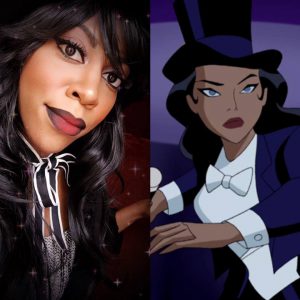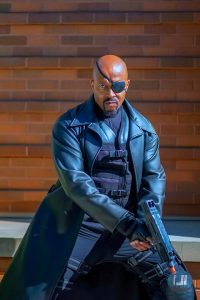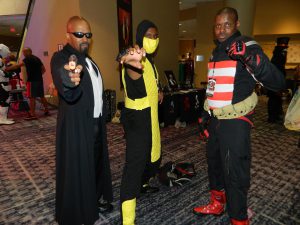 From Mav: Usually we try to mix topics on our show up from week to week; one week generally has very little to do with whatever happened the week before. This week is a little different, but only slightly. Last week, while I was prepping the Call for Comments for the She-Ra and Male Gaze/Superheroine redesigns show, and looking for pictures of Zatanna (who we talked about as emblematic of a technical description of “the male gaze” and what it means to have sexuality be inherent in a character) I happened to get a message from my friend and former student Ayana. She told me she was thinking of cosplaying as Zatanna and was wondering if I thought that was appropriate since doing so would mean portraying a character of a different race than she was (a Caucasian character portrayed by an African-American cosplayer). I told her to go for it. And she rocked it.
From Mav: Usually we try to mix topics on our show up from week to week; one week generally has very little to do with whatever happened the week before. This week is a little different, but only slightly. Last week, while I was prepping the Call for Comments for the She-Ra and Male Gaze/Superheroine redesigns show, and looking for pictures of Zatanna (who we talked about as emblematic of a technical description of “the male gaze” and what it means to have sexuality be inherent in a character) I happened to get a message from my friend and former student Ayana. She told me she was thinking of cosplaying as Zatanna and was wondering if I thought that was appropriate since doing so would mean portraying a character of a different race than she was (a Caucasian character portrayed by an African-American cosplayer). I told her to go for it. And she rocked it.
 But Ayana’s question highlights an interesting concept in the world of cosplay (a world that we’ve always wanted to explore on the show but hadn’t yet gotten to). If we take an artform (and I very much argue that cosplay is its own artform, which borrows and extends aspects construction, tailoring, performance and storytelling) that is predicated at the same time on adherence and accuracy to “canon” as well as personal expression through reimagination (paradoxical as those two things together sound) and we push that artform into a world which is increasingly aware and conscious of the idea of racial representation, what does it mean to “race-bend” a character in cosplay?
But Ayana’s question highlights an interesting concept in the world of cosplay (a world that we’ve always wanted to explore on the show but hadn’t yet gotten to). If we take an artform (and I very much argue that cosplay is its own artform, which borrows and extends aspects construction, tailoring, performance and storytelling) that is predicated at the same time on adherence and accuracy to “canon” as well as personal expression through reimagination (paradoxical as those two things together sound) and we push that artform into a world which is increasingly aware and conscious of the idea of racial representation, what does it mean to “race-bend” a character in cosplay?
There has, for quite some time, been a tradition of gender-bending cosplay. There are no shortage of women who cosplay as female versions of male characters. And there’s definitely a niche of male cosplayers who gender-bend female characters. However, the idea of race bending somehow feels a little more touchy, particularly when it comes to Caucasian fans. Gender-bending is one thing — race-bending is… different.
 One reason might be the relative lack of options for cosplayable characters for people of color. I first met cosplayer Fred Holt at a comic convention maybe a decade ago. Fred is a really nice African-American man in great physical shape. He looks like a real-life superhero. And it turns out this is pretty convenient, because when I met him, he was portraying Blade the Vampire Hunter. Since then I have also seen Fred portray Morpheus, Nick Fury, Roadblock and Luke Cage. In effect, because of his race and build he can perfectly portray the majority of black male superheroes (most of whom it turns out also seem to be bald and sporting goatees). However, as a consequence of this, it turns out he doesn’t look much like any other superhero. At least not in comic accurate form.
One reason might be the relative lack of options for cosplayable characters for people of color. I first met cosplayer Fred Holt at a comic convention maybe a decade ago. Fred is a really nice African-American man in great physical shape. He looks like a real-life superhero. And it turns out this is pretty convenient, because when I met him, he was portraying Blade the Vampire Hunter. Since then I have also seen Fred portray Morpheus, Nick Fury, Roadblock and Luke Cage. In effect, because of his race and build he can perfectly portray the majority of black male superheroes (most of whom it turns out also seem to be bald and sporting goatees). However, as a consequence of this, it turns out he doesn’t look much like any other superhero. At least not in comic accurate form.
 But it turns out that’s ok. Because cosplay is in effect about reimagination, the cosplay community tends to be relatively accepting of changes that allow for greater personal expression. I’m certainly not going to claim that it is post-racial. I’m sure both Ayana and Fred would both agree that there is still some amount of racism in the community. But there is also an understanding that the power that comes with adopting the persona of a superhero, the majority of whom are white, does not belong exclusively to white people. Race-bending from a person of color to a white character seems to imply a certain amount of respect and reverence for the character they are portraying.
But it turns out that’s ok. Because cosplay is in effect about reimagination, the cosplay community tends to be relatively accepting of changes that allow for greater personal expression. I’m certainly not going to claim that it is post-racial. I’m sure both Ayana and Fred would both agree that there is still some amount of racism in the community. But there is also an understanding that the power that comes with adopting the persona of a superhero, the majority of whom are white, does not belong exclusively to white people. Race-bending from a person of color to a white character seems to imply a certain amount of respect and reverence for the character they are portraying.
It doesn’t seem to work the other way. Because of the relative lack of options and representation for people of color in superhero and similar fandoms (even more so for non-black races), it seems impossible for a white cosplayer to adopt the minority persona without falling into at best a case of white washing and at worst a case of blackface minstrel-like parody. There is probably a line where it is ok (I’m betting even the whitest of white men could walk around in full WarMachine armor, with little problem so long as he never took the mask off), but that line is so fuzzy and ill-defined that it is probably very easy to step over accidentally. And on the other side of the line… there be dragons.
From Wayne: It was pretty white where I grew up. Like 100% white. It was rural and when I was a kid the only black people I knew were George Jefferson and Jimmy “JJ” Walker. Well, them and the few characters from comics like T’Challa and Luke Cage.
I bought the first issue of Luke Cage: Hero For Hire off the racks at a newsstand in the small town of Claysville. No black people there either. Given my utter lack of experience with an urban setting and black culture Luke quickly became one of my favorite characters. Now, I recognize that some of those stories and portrayals are problematic, mainly because they were mostly written by white guys. But at the time none of that mattered. For whatever reason, I liked the character and was able to project myself into him.
 I was a weird kid, thanks to comics. I wanted to push the envelop a little back then in terms of my personal identity. I grew my hair long. I wore a variety of chokers. I wanted to wear clothes that were a little more colorful and vibrant than most of my peers. I’m sure I was the only kid in my sixth grade class with brightly checkered bell bottoms. I pushed a little… enough to stand out, not enough to get my ass kicked every day. For a couple of years I wore a denim hat just like the one JJ wore. DYN-O-MITE! The idea of cultural appropriation was just not a thing back then.
I was a weird kid, thanks to comics. I wanted to push the envelop a little back then in terms of my personal identity. I grew my hair long. I wore a variety of chokers. I wanted to wear clothes that were a little more colorful and vibrant than most of my peers. I’m sure I was the only kid in my sixth grade class with brightly checkered bell bottoms. I pushed a little… enough to stand out, not enough to get my ass kicked every day. For a couple of years I wore a denim hat just like the one JJ wore. DYN-O-MITE! The idea of cultural appropriation was just not a thing back then.
There was a clothing store at the mall called Chess King that catered to 70s fashions. It was a little more expensive but every once in awhile I could talk my Mom into buying me a colorful shirt. Once we found a bright yellow shirt made of some kind of silky material, probably polyester, with big, puffy, pirate sleeves. You know, just like Luke Cage wore. Well, I had to have it, mainly so I could wear it while I ran around the back yard pretending to be Luke. It was cosplay. I did wear it to school as well, engaging in what is now called stealth cosplay.
So, what’s my point? Part of the reason to read fiction is to be able to project yourself into the lives and experiences of others who are not like you. It is a way to learn about other cultures, other races, genders, sexualities… whatever. It’s a way to build empathy and genuine understanding for those who are not like you. Cosplay is an extension of this idea of trying on a different identity.
Obviously, the problem comes in with an imbalance in the social power structure. All too often white male voices have been the only ones that have written these characters. As much as I may like or identify with a character like Luke Cage you probably won’t be seeing me reprising my cosplay anytime soon. But somehow it is different to see a POC portraying any character. Like Mav said, some of this is the lack of choices they have traditionally had, and some of it is redressing the imbalance in representation and power dynamics.
So we’re gonna talk about all of this.
For the record, the last cosplay I did was Peter Capaldi’s Doctor. I’m old, English, and have a thing for frock coats, so it’s all cool.
From Mav: So, we’re wondering your thoughts. Is it ok for race-bending in cosplay to occur? Is there a power that comes from doing so? Is it any different than gender-bending (or do you have a problem with that too) Does the race of the cosplayer matter? Are there some circumstances where it works better than others? What are the rules and why do you think they are what they are? What do you think?
Related
Call for Comments: Cosplayers of Color
August 5, 2018
There has, for quite some time, been a tradition of gender-bending cosplay. There are no shortage of women who cosplay as female versions of male characters. And there’s definitely a niche of male cosplayers who gender-bend female characters. However, the idea of race bending somehow feels a little more touchy, particularly when it comes to Caucasian fans. Gender-bending is one thing — race-bending is… different.
It doesn’t seem to work the other way. Because of the relative lack of options and representation for people of color in superhero and similar fandoms (even more so for non-black races), it seems impossible for a white cosplayer to adopt the minority persona without falling into at best a case of white washing and at worst a case of blackface minstrel-like parody. There is probably a line where it is ok (I’m betting even the whitest of white men could walk around in full WarMachine armor, with little problem so long as he never took the mask off), but that line is so fuzzy and ill-defined that it is probably very easy to step over accidentally. And on the other side of the line… there be dragons.
From Wayne: It was pretty white where I grew up. Like 100% white. It was rural and when I was a kid the only black people I knew were George Jefferson and Jimmy “JJ” Walker. Well, them and the few characters from comics like T’Challa and Luke Cage.
I bought the first issue of Luke Cage: Hero For Hire off the racks at a newsstand in the small town of Claysville. No black people there either. Given my utter lack of experience with an urban setting and black culture Luke quickly became one of my favorite characters. Now, I recognize that some of those stories and portrayals are problematic, mainly because they were mostly written by white guys. But at the time none of that mattered. For whatever reason, I liked the character and was able to project myself into him.
There was a clothing store at the mall called Chess King that catered to 70s fashions. It was a little more expensive but every once in awhile I could talk my Mom into buying me a colorful shirt. Once we found a bright yellow shirt made of some kind of silky material, probably polyester, with big, puffy, pirate sleeves. You know, just like Luke Cage wore. Well, I had to have it, mainly so I could wear it while I ran around the back yard pretending to be Luke. It was cosplay. I did wear it to school as well, engaging in what is now called stealth cosplay.
So, what’s my point? Part of the reason to read fiction is to be able to project yourself into the lives and experiences of others who are not like you. It is a way to learn about other cultures, other races, genders, sexualities… whatever. It’s a way to build empathy and genuine understanding for those who are not like you. Cosplay is an extension of this idea of trying on a different identity.
Obviously, the problem comes in with an imbalance in the social power structure. All too often white male voices have been the only ones that have written these characters. As much as I may like or identify with a character like Luke Cage you probably won’t be seeing me reprising my cosplay anytime soon. But somehow it is different to see a POC portraying any character. Like Mav said, some of this is the lack of choices they have traditionally had, and some of it is redressing the imbalance in representation and power dynamics.
So we’re gonna talk about all of this.
For the record, the last cosplay I did was Peter Capaldi’s Doctor. I’m old, English, and have a thing for frock coats, so it’s all cool.
From Mav: So, we’re wondering your thoughts. Is it ok for race-bending in cosplay to occur? Is there a power that comes from doing so? Is it any different than gender-bending (or do you have a problem with that too) Does the race of the cosplayer matter? Are there some circumstances where it works better than others? What are the rules and why do you think they are what they are? What do you think?
Share this:
Related